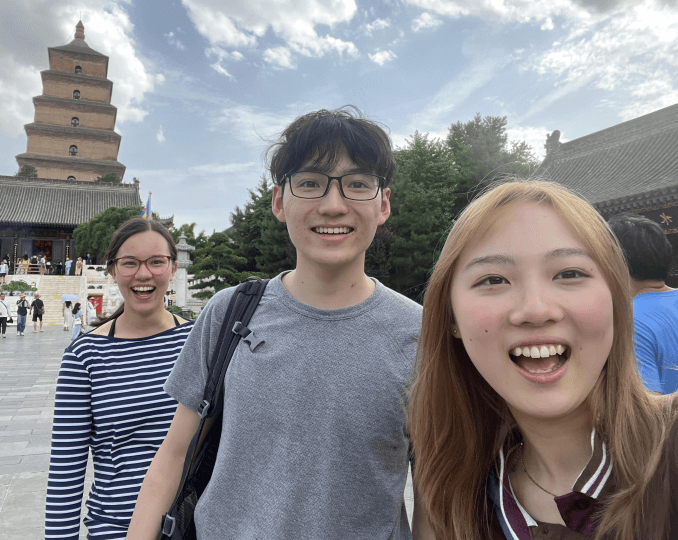Emily Xing, right, with fellow SEAS students Sophie-An Kingsbury Lee and Ethan Kiang in Beijing as part of the Harvard-China Project on Energy, Economy and Environment
As a member of Harvard’s chapter of Engineers Without Borders, Emily Xing knowshow engineering can impact local communities, but she also wanted to understand how engineering can make a difference nationally, even globally.
Xing spent the summer at Tsinghua University’s Institute for Carbon Neutrality in Beijing as part of the Harvard-China Project on Energy, Economy and Environment undergraduate research program. Since 1993, the Harvard-China Project works with partner institutions in China to study and design effective policies to address the global challenges of climate change, air quality, energy systems, and economic development. Based at the Harvard John A. Paulson School of Engineering and Applied Sciences (SEAS), the Harvard-China Project sends Harvard students to China every summer to research climate science on a much larger scale.
“China is definitely a leader in renewable energy and energy transition right now, so it wasa really good opportunity to get into that network of research,” said Xing, a second-year applied math concentrator. “It was also a way to scope out the research landscape in another country. I also thought it was a really good opportunity to experience my culture, because I’m from China but haven’t been back in awhile. When I first got back there was some cultural shock. But as I got more integrated, it made me really nostalgic. It opened my eyes to a new way that people lived.”
Xing was one of three SEAS students to study at Tsinghua University’s Institute for Carbon Neutrality in Beijing this summer, alongside classmate Ethan Kiang and third-year environmental science and engineering concentrator Sophie-An Kingsbury Lee.
“The program gave us a really good overview of what working in a fast-paced environmental lab was like,” she said. “I have a social science background, and I’m motivated by people and how the environment affects people. I took on this research opportunity with the idea of building a more just and equitable energy world for people living in both China and around the world.”
As a research assistant, Xing took on multiple projects during her summer at Tsinghua University, including research onreducing the cost of renewable energy in China, which she’s still working on with the goal of eventual publication. She also did a case study on reducing emissions in the information, communications and technology industry andattended multiple conferences.
“While we were at the Institute for Carbon Neutrality, there were a group of researchers from Hong Kong who visited our lab,” she said. “We got to visit a bunch of facilities in Beijing, see self-driving cars being built at a factory, and also check out the Capital for Hydrogen Energy and Chinese Academy of Sciences. It was really cool to see a country that isn’t America, which I’ve been in for a long time, really take pride in what they were doing.”
Press Contact
Matt Goisman | mgoisman@g.harvard.edu
